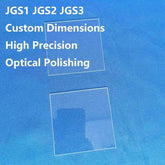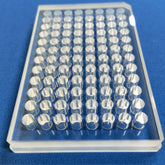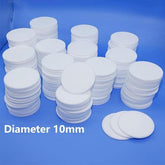Sapphire glass is unbreakable, or does it need to be carefully protected?
Sapphire glass is highly regarded in the watch and high-end electronics industries due to its high hardness and scratch resistance. However, it is important to consider whether this seemingly impregnable material has any weaknesses. This article will delve into the characteristics of sapphire glass, usage precautions, and whether they can really be scratched.
1. What is sapphire glass?
Sapphire glass is a term used to describe a synthetic material, not natural sapphire. The main component of synthetic sapphire is aluminium oxide (Al2O3), and it can be produced in large quantities and at an economical price in a laboratory setting through artificial synthesis. Sapphire glass boasts a hardness of 9 on the Mohs scale, placing it second only to diamond in terms of scratch resistance.

2. The advantages of sapphire glass
(1) High hardness
Sapphire glass is renowned for its high hardness, making it a durable material suitable for daily use. It is highly resistant to scratches from typical everyday items, such as keys and metal accessories.
(2) High transparency
The sapphire glass exhibits high transparency and can clearly display the time or screen content.
(3) Chemical resistance
In addition, sapphire glass is resistant to chemical corrosion, able to withstand high temperatures, exhibits effective heat conduction and excellent chemical stability. Therefore, it is extensively utilized in optics, electronics and other domains.
 3. Precautions for the use of sapphire glass
3. Precautions for the use of sapphire glass
Although sapphire glass boasts a number of advantages, there are still a few points that require careful consideration when using it.
(1) Avoid contact with extremely hard substances
Despite the fact that sapphire glass is characterized by its extreme hardness, it is still necessary to exercise caution and avoid contact with other extremely hard substances, such as diamonds, grinding stones and sandpaper, in order to prevent the occurrence of scratches.
(2) Prevent impact
While sapphire glass is renowned for its scratch-resistance, it is not indestructible and can still shatter. It is important to avoid impacts during use in order to prevent shattering.
(3) Pay attention to the usage environment
In harsh environments, such as strong sandstorms and desert areas, the hardness of the sand may exceed that of sapphire glass, causing the glass surface to be scratched. In such circumstances, it is advisable to implement additional protective measures.
 4. Could the sapphire glass surface get scratched?
4. Could the sapphire glass surface get scratched?
Sapphire glass is renowned for their exceptional scratch resistance, with 99% of objects being unable to cause damage to them. However, during regular use, there may still be instances where it could be scratched.
(1) The diamond components in gravel
In everyday life, gravel may contain diamond components. It is important to note that these extremely hard particles have the potential to scratch the sapphire glass surface during the friction process.
(2) Scratched by sharp objects
Despite its resistance to scratching, it is important to note that sapphire glass can still be susceptible to damage from sharp objects. When the force-bearing area is small, the contact point is sharp and the speed and force are significant, it is still possible to cause scratches.
In summary, sapphire glass is highly regarded for its hardness and scratch resistance. However, it is important to note that this material is not indestructible. During use, it is still necessary to avoid contact with extremely hard substances, prevent impact, and take additional protective measures in harsh environments.






